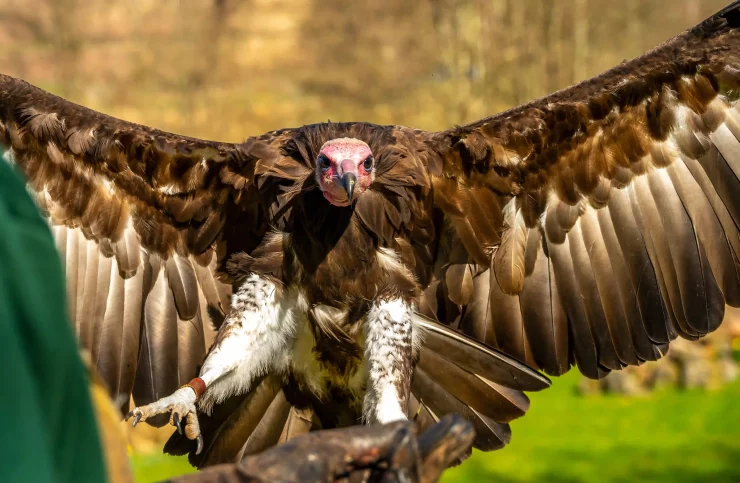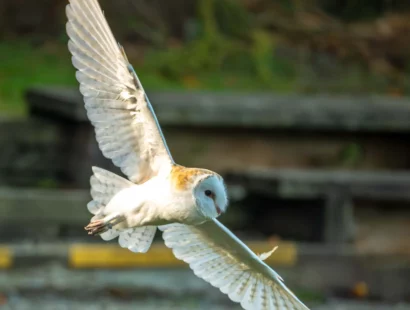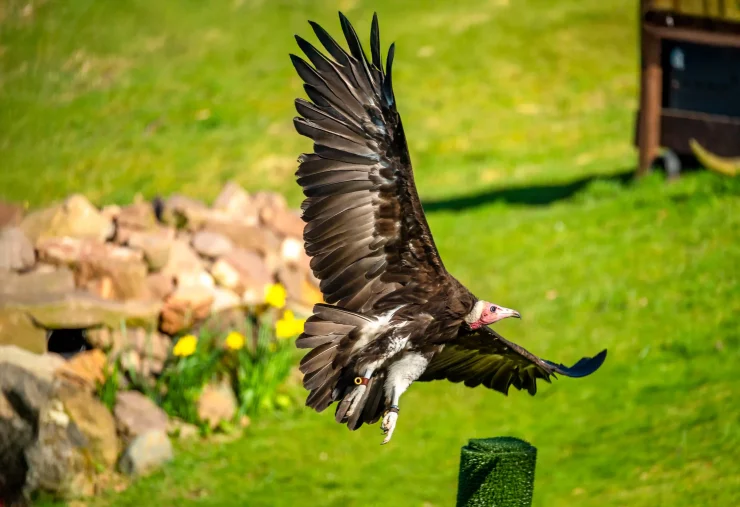
Bird of Prey Flying Experience
This incredible hands-on experience with our birds-of-prey lets you see what falconry is all about. You’ll get to watch our bird-of-prey display and fly our enormous vulture Kevin glove-to-glove.
- 45-minute experience
- Flying display with a range of our birds
- Glove-to-glove flying experience with our vulture Kevin
- Four people maximum
- Individual or group experience for 16+
All animal experiences must be booked online at least two weeks in advance.
Our bird-of-prey experience is usually booked as an individual experience but we can accommodate up to four adults (16-plus). You’ll get to join our bird-of-prey flying display where you’ll get to meet a variety of birds and learn about their behaviours.
During the display you’ll get the chance to fly our vulture Kevin with one of the keepers. You’ll also be able to ask our keepers any questions about their role here at the park and the different birds they work with.
This is a very exclusive experience for our guests as we only offer one flying experience a day. This is to ensure our birds stay nice and relaxed and aren’t overwhelmed by too many visitors.

Meet Kevin the vulture
Kevin is one of our main celebrities at the bird-of-prey centre. With a wing-span of 1.8m, you can’t miss him. Amongst his keepers, Kevin is quite famous for his lack of agility, but he’s a very important part of our team as he allows the keepers to educate everyone about the vital role these birds play in the wild.
Vultures: nature’s bin-men
Despite their scary appearance, vultures are really fascinating birds. They’re a very important species in Africa because, as carrion birds, they feed on the remains of other animals, which means they keep the countryside clear of carcasses and prevent the spread of disease.
Flocks of vultures can often be seen soaring over the landscape, searching for carcasses, and sometimes following animals as they migrate. Vultures will also eat scraps from human habitats.
Vulture conservation
You may not know, but vultures are now the most threatened bird species in the world. Many birds are hunted, poisoned by pesticides and lead fragments from bullets, injured by electricity cables or hit by cars when feeding on road-kill.
Through out Link to the Wild initiative, we support VulPro – a charity working in South Africa to protect, rehabilitate and re-release these amazing birds. Their work includes:
- The rescue and retrieval of downed and injured birds
- Purpose-built release enclosures
- Rehabilitation and medical costs
- Monitoring and tracking devices
- Mapping habitats to better understand vulture behaviour
Did you know?
A vulture’s stomach is anti-bacterial
Vultures feed on carcasses, many of which will have been sitting out in the sun for days. That’s why their stomach is specially adapted to break down and destroy the bacteria in rotten meat. This clever trick means vultures effectively remove many dangerous bacterial diseases from the environment, making the planet a cleaner and safer place for us all.
Important Information
Pregnant women and those who have recently given birth are not able to take part in any of our experiences until at least six months after giving birth.
If you have any accessibility requirements, please contact us before making your booking so we can ensure your experience is tailored to your needs.
If you keep/work with poultry or any other birds, please get in touch with us before your visit. This helps us take the necessary precautions to ensure the safety and wellbeing of both your birds and ours.




